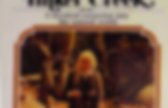

Why Annie Dillard Stopped Publishing New Material. The abundance, a selection from the work of one of the great, original voices in recent American letters, might just as easily be called The Absence.

It speaks of absence—for nature’s profusion, in Annie Dillard, is everywhere the signage of the hidden god she seeks—and it also marks an absence: hers. Dillard’s first book appeared in 1974. Over the following 25 years, she published 10 more original volumes, including two that have achieved the status of modern classics, Pilgrim at Tinker Creek, a latter-day Walden, and The Writing Life, a “spiritual Strunk & White” (as one reviewer put it), and two more that deserve to, Holy the Firm, which might have been written in letters of flame, and Teaching a Stone to Talk, a jewel box of narrative meditations. (Some might add An American Childhood, her celebrated memoir.) In the 17 years since, she’s published one, and none since 2007. The Abundance only serves to underscore the dearth. But in Pilgrim there is no economy and no society. Annie Dillard on the two ways of seeing, Kafka's letter to his emotionally abusive father, how Steinbeck used the diary as a tool of discipline & more.
Hello, Peggy Fleming!
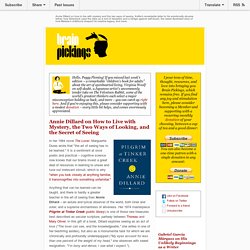
If you missed last week's edition – a remarkable "children's book for adults" about the art of openhearted living, Virginia Woolf on self-doubt, a Japanese artist's uncommonly tender take on The Velveteen Rabbit, some of the world's greatest thinkers each select a major misconception holding us back, and more – you can catch up right here. And if you're enjoying this, please consider supporting with a modest donation – every little bit helps, and comes enormously appreciated. Annie Dillard on How to Live with Mystery, the Two Ways of Looking, and the Secret of Seeing In her 1984 novel The Lover, Marguerite Duras wrote that "the art of seeing has to be learned. " It is a sentiment at once poetic and practical – cognitive science now knows that our brains invest a great deal of resources in learning to unsee and tune out irrelevant stimuli, which is why "when you look closely at anything familiar, it transmogrifies into something unfamiliar.
" Dillard writes: ... ... How We Spend Our Days Is How We Spend Our Lives: Annie Dillard on Presence Over Productivity. By Maria Popova The meaning of life has been pondered by such literary icons as Leo Tolstoy (1904), Henry Miller (1918), Anaïs Nin (1946), Viktor Frankl (1946), Italo Calvino (1975), and David Foster Wallace (2005).
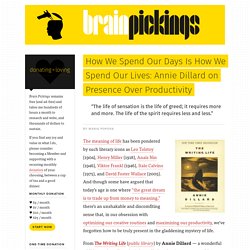
And though some have argued that today’s age is one where “the great dream is to trade up from money to meaning,” there’s an unshakable and discomfiting sense that, in our obsession with optimizing our creative routines and maximizing our productivity, we’ve forgotten how to be truly present in the gladdening mystery of life. From The Writing Life (public library) by Annie Dillard — a wonderful addition to the collected wisdom of beloved writers — comes this beautiful and poignant meditation on the life well lived, reminding us of the tradeoffs between presence and productivity that we’re constantly choosing to make, or not:
Annie Dillard on the Art of the Essay and Narrative Nonfiction vs. Poetry and Short Stories. By Maria Popova “Only a person who is congenitally self-centered has the effrontery and the stamina to write essays,” E.B.
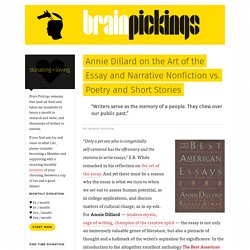
White remarked in his reflection on the art of the essay. And yet there must be a reason why the essay is what we turn to when we set out to assess human potential, as in college applications, and discuss matters of cultural charge, as in op-eds. Annie Dillard on Writing. By Maria Popova “At its best, the sensation of writing is that of any unmerited grace.
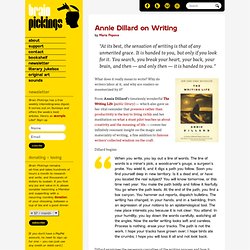
It is handed to you, but only if you look for it. You search, you break your heart, your back, your brain, and then — and only then — it is handed to you.” What does it really mean to write? Why do writers labor at it, and why are readers so mesmerized by it? From Annie Dillard’s timelessly wonderful The Writing Life (public library) — which also gave us her vital reminder that presence rather than productivity is the key to living richly and her meditation on what a stunt pilot teaches us about creativity and the meaning of life — comes her infinitely resonant insight on the magic and materiality of writing, a fine addition to famous writers’ collected wisdom on the craft. Annie Dillard Official Website.